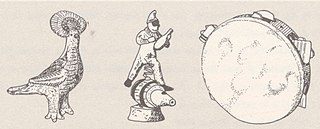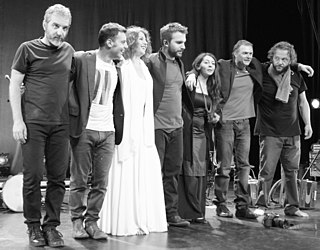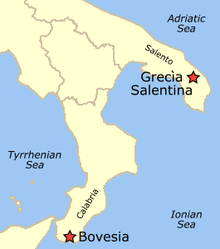
Magna Graecia is a term that was used for the Greek-speaking areas of Southern Italy, in the present-day Italian regions of Calabria, Apulia, Basilicata, Campania and Sicily; these regions were extensively populated by Greek settlers starting from the 8th century BC.
Modern Greek, generally referred to by speakers simply as Greek, refers collectively to the dialects of the Greek language spoken in the modern era, including the official standardized form of the language sometimes referred to as Standard Modern Greek. The end of the Medieval Greek period and the beginning of Modern Greek is often symbolically assigned to the fall of the Byzantine Empire in 1453, even though that date marks no clear linguistic boundary and many characteristic features of the modern language arose centuries earlier, having begun around the fourth century AD.

Gerhard Rohlfs was a German linguist. He taught Romance languages and literature at the universities in Tübingen and Munich. He was described as an "archeologist of words".

Grecìa Salentina is an area in the peninsula of Salento in southern Italy, near the town of Lecce which is inhabited by the Griko people, an ethnic Greek minority in southern Italy who speak Griko, a variant of Greek.

Salento, also known as Terra d'Otranto, is a cultural, historical and geographic region at the southern end of the administrative region of Apulia, in southern Italy. It is a sub-peninsula of the Italian Peninsula, sometimes described as the "heel" of the Italian "boot". It encompasses the entire administrative area of the province of Lecce, a large part of the province of Brindisi and part of that of Taranto.

Bovesia, otherwise known as Grecìa Calabra, is one of the two remaining Griko-speaking areas in southern Italy, the other being Grecìa Salentina. It is located at the tip of Calabria, near Reggio, and consists of nine villages. Its population is significantly smaller than the one of Grecìa Salentina.
Ghetonia is a cultural group based in Calimera, Grecìa Salentina in southern Italy, which exists to preserve the music, poetry, language and folklore of the Griko-speaking people of Salento by documenting the various aspects of the Grecìa Salentina traditional life, history, language and folklore, and has published extensively on these subjects. However, Ghetonia is best known for its musical group whose members include Roberto Licci, Emilia Ottaviano, Salvatore Cotardo, Emmanuelle Licci, Angelo Urso and Franco Nuzzo.
Calimera, is a small town of 6,753 inhabitants (2021) in the Grecìa Salentina area of the Salento peninsula in Italy, located between Gallipoli and Otranto. It belongs to the province of Lecce.

Martignano is a small town and comune of 1,770 inhabitants in the province of Lecce in Apulia, Italy. It is part of Salento and is one of the nine towns of Grecìa Salentina, an area where the Greek dialect Griko is spoken.

Corigliano d'Otranto is a small town and comune of 5,632 inhabitants in the province of Lecce in Apulia, Italy. It is one of the nine towns of Grecìa Salentina. The inhabitants of Corigliano, alongside Italian, also speak Griko, a Greek dialect.
The primary languages of Calabria are the Italian language as well as regional varieties of Extreme Southern Italian and Neapolitan languages, all collectively known as Calabrian. In addition, there are speakers of the Arbëresh variety of Albanian, as well as Calabrian Greek speakers and pockets of Occitan.

Italian folk music has a deep and complex history. National unification came quite late to the Italian peninsula, so its many hundreds of separate cultures remained un-homogenized until quite recently. Moreover, Italian folk music reflects Italy's geographic position at the south of Europe and in the center of the Mediterranean Sea: Celtic, Slavic, Arabic, Greek, Spanish and Byzantine influences are readily apparent in the musical styles of the Italian regions. Italy's rough geography and the historic dominance of small city states has allowed quite diverse musical styles to coexist in close proximity.

Calabrian Greek is the variety of Italiot Greek used by the ethnic Griko people in Calabria, as opposed to the Italiot Greek dialect spoken in the Grecìa Salentina. Both are remnants of the Ancient and Byzantine Greek colonization of the region.

Palizzi is a comune (municipality) in the Province of Reggio Calabria in the Italian region Calabria, located about 120 kilometres (75 mi) southwest of Catanzaro and about 30 kilometres (19 mi) southeast of Reggio Calabria. The southernmost point in mainland Italy lies in Palizzi.

Salentino is a dialect of the Extreme Southern Italian spoken in the Salento peninsula, which is the southern part of the region of Apulia at the southern "heel" of the Italian peninsula.

Greek presence in Italy began with the migrations of traders and colonial foundations in the 8th century BC, continuing down to the present time. Nowadays, there is an ethnic minority known as the Griko people, who live in the Southern Italian regions of Calabria and Apulia, especially the peninsula of Salento, within the ancient Magna Graecia region, who speak a distinctive dialect of Greek called Griko. They are believed to be remnants of the ancient and medieval Greek communities, who have lived in the south of Italy for centuries. A Greek community has long existed in Venice as well, the current centre of the Greek Orthodox Archdiocese of Italy and Malta, which in addition was a Byzantine province until the 10th century and held territory in Morea and Crete until the 17th century. Alongside this group, a smaller number of more recent migrants from Greece lives in Italy, forming an expatriate community in the country. Today many Greeks in Southern Italy follow Italian customs and culture, experiencing assimilation.

The Griko people, also known as Grecanici in Calabria, are an ethnic Greek community of Southern Italy. They are found principally in the regions of Calabria and Apulia. The Griko are believed to be remnants of the once large Ancient and Medieval Greek communities of Southern Italy, although there is some dispute among scholars as to whether the Griko community is directly descended from Ancient Greeks, from more recent medieval migrations during the Byzantine period, or a combination of both.

Canzoniere Grecanico Salentino (CGS), formed by writer Rina Durante in 1975, is a traditional music ensemble from Salento, Italy. The seven piece band and dancer perform a contemporary style of Southern Italy's traditional Pizzica music and dance.

Italiot Greek, also known as Italic-Greek and Salentino-Calabrian Greek refers to two varieties of Modern Greek spoken in Italy by the Griko people.

The Extreme Southern Italian dialects are a set of languages spoken in Salento, Calabria, Sicily and southern Cilento with common phonetic and syntactic characteristics such as to constitute a single group. These languages derive, without exception, from Vulgar Latin but not from Tuscan; therefore it follows that the name "Italian" is a purely geographical reference.












